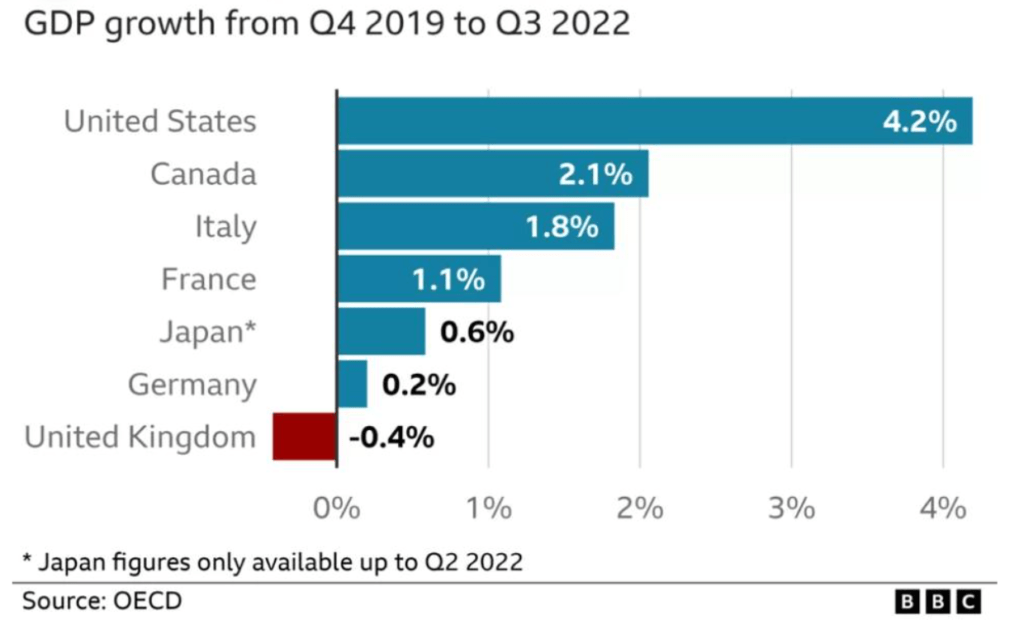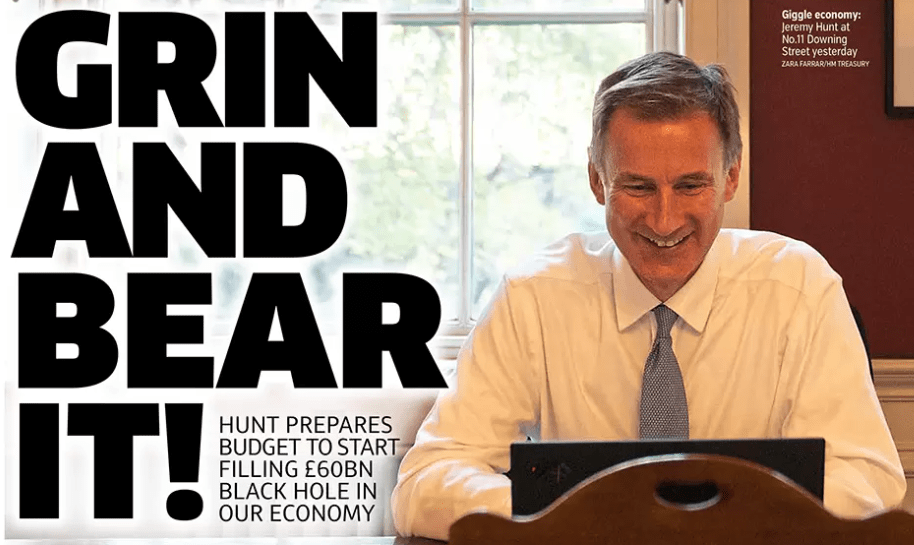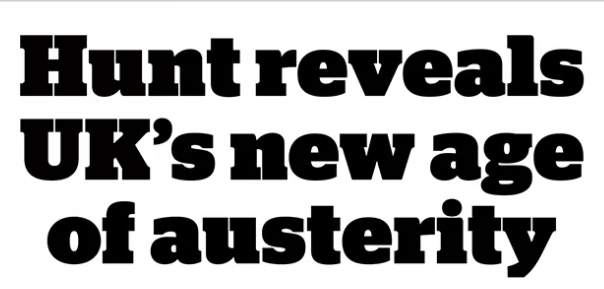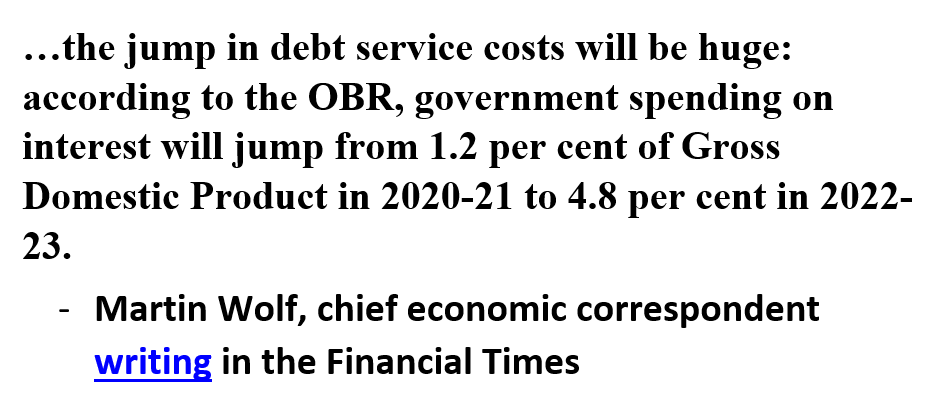Jeremy Hunt’s autumn financial statement means there will be no let-up in the drive to impoverish the majority of the population in pursuit of profit. According to the Office for Budget Responsibility, a bastion of the Establishment if ever there was one, living standards are set to fall by 7 per cent in the next two years, the biggest drop since records began.
We can be sure that while this is the ‘official’ figure, for many households it will be a minimum and millions will be much worse off. The Tories have been the custodians of the British economy for twelve years and for that whole time there has been no let-up in austerity. Yet the belt-tightening is set to increase. It is a case of no jam today and no jam tomorrow.
There are around fourteen and a half million people who are already living in poverty in the UK, according to the Joseph Rowntree Foundation’s UK Poverty Profile 2022. That is already more than one in every five people and of these, more than eight million are working-age adults, over four million are children and over two million more are pensioners.
According to the Resolution Foundation 1.3 million more people will be plunged into absolute poverty by 2023, including half a million children. It is a grim future that is faced by working class people.
Recession for at least two years
The British economy is now entering a recession likely to last at least two years. But unlike the poverty suffered in the 1930s, most of those in poverty today are working poor – with low-paid workers like nurses forced to rely on food banks. The uplift in the National Living Wage by 92p an hour is a pitiful cosmetic measure – and that is not until April – and it will do nothing to alleviate serious poverty and insecurity today.

Social housing rents may be capped at 7% rises – again from next April – but there are no measures to stop big rises in private rents, which is now a bigger sector than social housing. Those who pay mortgages have already found that their payments have gone up by hundreds of pounds a month, thanks to rising interest rates. It is increasingly difficult for families to be able to afford to either rent or buy decent housing and nothing in this financial statement addresses that fundamental problem.
Energy prices are going to be capped in April at £3,000 a year for a typical household, and we are supposed to be grateful for this, even though it will mean energy prices nearly three times higher than two years ago. The Tories claim – like David Cameron twelve years ago – that “we’re all in this together” and that the war in Ukraine is to blame. Yet energy prices rises across Europe have been nowhere near as large as in the UK, and we supposedly have the ‘benefit’ of North Sea oil and gas.
While Hunt is giving crumbs with one hand, like the increase in state pension, he is taking away even more with the other. Income tax thresholds are to be frozen for the next five years – until 2028 – so that workers who manage to edge their wages upwards will end up paying more income tax.
Energy companies will find tax loopholes
To try to sugar a very bitter pill, Hunt announced an increase on windfall profits for energy companies, but there are no big announcements in the House of Commons on the detail, because all the loopholes would become apparent. Having issued over a hundred new exploration licences, the Tories will make sure that energy companies will find ways to ‘invest’ enough to offset against taxes.
To multiply the difficulties facing workers, Hunt has effectively frozen expenditure on those services upon which working class people depend: education, local government, and the NHS. There is a massive backlog of operations in the NHS, and that will increase. Hunt claims to be increasing spending on the NHS and on social care “in real terms” but it is well known that inflation in these sectors is above the ‘average’ of 10% – energy alone increasing in price on the same scale as domestic properties – and Hunt’s “increase” is in fact a decrease.

Pay for NHS staff is appallingly low and there is no additional money to pay staff a decent wage. There is already a £9bn shortfall in capital investment in the NHS as hospitals and clinics fall apart. Hunt was a prime mover in broadening the private health sector at the expense of the NHS and he is continuing the Tories’ long-term strategy of running the NHS into the ground so it becomes so poor that many are forced to go to the private sector.
The longest and deepest cut in living standards for two hundred years
In local government, despite even Tory councils claiming that they are heading for bankruptcy, there is no relief. Local authorities have lost over a third of their total national government funds since 2010. Weasel words from Hunt, thanking teachers and schools for their “brilliant work” mean nothing, when teachers, like other local authority workers, are expected to suffer a cut in their living standards. Modest increases in expenditure will be swiftly gobbled up by increased energy and other costs and will leave nothing to offer the “brilliant” educators a decent wage.
The economic “storm” to which Hunt refers is not a quirk of nature like the weather, and nor is it the product of the war in Ukraine. It flows directly from the special weakness of British capitalism, combined with twelve years of Tory government, further exacerbated, we might add, by Brexit. Far from promoting a “high wage, high skill” economy – echoing the words of Johnson – Hunt represents a political and economic elite whose strategy is framed around a low-wage, low-investment economy.
The economic crisis faced by working class families is not just an indictment of a failed government, it is an indictment of capitalism, a system based on the preservation at all costs of rent, interest, and profit. According to the Institute for Fiscal Studies, “average household income per head is due to be the same in 2027-28 as it was in 2018-19, and 31% below where it would have been if the pre-2008 trend had continued”. This is the longest period of wage stagnation for two hundred years.

In the sixth richest country on the planet, instead of society moving forward, the last ten years we have seen it moving backwards. The lives of ordinary people are increasingly characterised by insecurity, worry and uncertainty. Food poverty, energy poverty and housing poverty intertwine with soul-destroying results for millions of people. These are the products of a particular economic system, not accidental or chance factors.
Labour leaders agree with the Tories in principle
There will be growing outrage among workers as they see their living standards whittled away year on year. It is not surprising that nearly two million are already engaging in strikes for decent pay or are balloting for strike action.
Within the labour movement as a whole, there needs to be an urgent discussion about the answer to Tory austerity. It is a disgrace that the Labour leadership are so wedded to Tory-lite policies, that they offer no real alternative. In principle, in broad economic terms, they support the ‘fiscal responsibility’ of Jeremy Hunt.
Interviewed on ITV, Keir Starmer explicitly refused to back the justified pay claim of NHS nurses on the grounds that Labour “would not make promises it couldn’t keep”. Were Keir Starmer and Rachel Reeves at the helm, they would be carrying out broadly similar measures to Hunt. Their quibble with Hunt and Sunak is only on the detail.
What is worse, from the point of view of the Labour leadership, is that many of the measures announced by Hunt are ‘back-loaded’ to come into effect in two or three years’ time after the next general election. An incoming Labour government will be handed a poisoned chalice and Hunt is busy adding more arsenic to the gift. It is a guarantee that the next Labour government – assuming Starmer doesn’t snatch defeat from the jaws of victory, like Kinnock (twice) – will be a government of political and economic crisis from the beginning.
There needs to be a discussion in the movement, not least, on the direction and purpose of the Labour Party. That is particularly important for those members of right-wing unions affiliated to Labour – USDAW, UNISON and the GMB. These union members should be asking their leaders why they support a Labour leader who is opposed to the economic interests of union members.
We need to address illusions within the left
The labour movement must discuss a genuine alternative to a system based on profit and greed. We need to address those illusions popular within the left, that the capitalist system is capable of moving in a different direction, by some kind of ‘left tinkering’.

For example, writing in the Guardian the director of the Progressive Economy Forum, James Meadway, made a point similar to one made by others on the left, that the “fiscal black hole” faced by the Tories is imaginary . “The ‘fiscal black hole’ is not a hard economic fact,” he wrote, “It’s the result of uncertain forecasts and the government’s own target for the level of debt in five years’ time”
It is true that the forecasts of the government and the OBR are uncertain. That is in the nature of economics. That much was even argued by Tories like Jacob Rees-Mogg who tweeted on Monday, “Mystic Meg’s predictions are more accurate than the OBR’s”. Even the right-wing Daily Telegraph had a dig on their front page, in an article headed, “We face punishing tax rises to placate a body no one voted for [the OBR] – and whose forecasts are often wrong”.
Of course these right-wing individuals and newspapers are complaining about the relatively small tax-increases for the rich, but they have no objections to higher taxes for workers or cuts in the services upon which workers depend. But the premise on which they base their arguments are no different to some of those on the left – that there is ‘no black hole’ in public finances and it is false. A capitalist economy functions by borrowing on the open market and paying back over many years. It is unsustainable, on the basis of capitalism, for any government to permanently borrow more than it raises in taxes.
Twelve years of quantitative easing – printing £875bn
What is implied in James Meadway’s analysis is that any UK government can promote growth and thereby avoid austerity by a judicious use of public expenditure by printing money at the Bank of England. It is the argument put forward by some on the left of the Labour Party.
For example, John McDonnell tweeted, “Jeremy Hunt’s austerity budget: necessity or political choice? It definitely is a political choice…”. When he was Shadow Chancellor, he frequently called for a “people’s quantitative easing”, in other words printing money to stimulate the economy. But this argument, so-called Modern Monetarist Theory, is based on a false premise.
The massive degree of quantitative easing applied by the Bank of England over twelve years ‘created’ £875bn in cash to buy back government bonds. As Marxist economists have pointed out in the past (see Michael Roberts’ articles here), printing money that is not backed by gold or production will in the end create inflation by devaluing the currency. In fact, a part of the current rise in inflation internationally, is due to the massive quantitative easing by central banks around the world.
In the UK specifically, quantitative easing has only resulted in a big increase in speculative investment, higher property prices and company take-overs. The newly printed money has not led to useful productive investment, and there is no guarantee that it ever will, if the economy is overwhelmingly in private hands.
The whims and caprices of the market
It is clear from the events in September that as long as the UK economy sits within the world market, it will be subject to its whims and caprices, like a small sailing vessel that is buffeted by winds and currents. If the economic strategy of Kwasi Kwarteng and Liz Truss could be easily broken by world markets, a policy of ‘people’s quantitative easing’ would prove to be just as brittle.
The only way to guarantee the livelihoods of British workers in the coming years is an economic strategy that is not based on the domination of the market. The traditions of the Labour Party were built around the old Clause IV for a reason – because the public ownership and control of the means of production, distribution and exchange was rightly seen as the only means of rationally planning an economy.
The big decisions that determine the lives of millions of workers, around the balance of investment and consumption, should be made on the basis of what is best for all, not what is profitable for a few. A democratically planned, nationalised economy, with the main levers of industry, finance, transport, and utilities in public hands, could provide for all the necessities of life for the population. That has to be the direction of travel for the labour movement and the principles on which socialists should fight for change.
The Tories’ and the system they represent offer nothing but blood, toil, tears and sweat to working class people for the indefinite future. It is time to build a movement that will do away with the system altogether. It is time to fight for a system that can plan all the resources, wealth, and skills of the country in the interests of the many.



